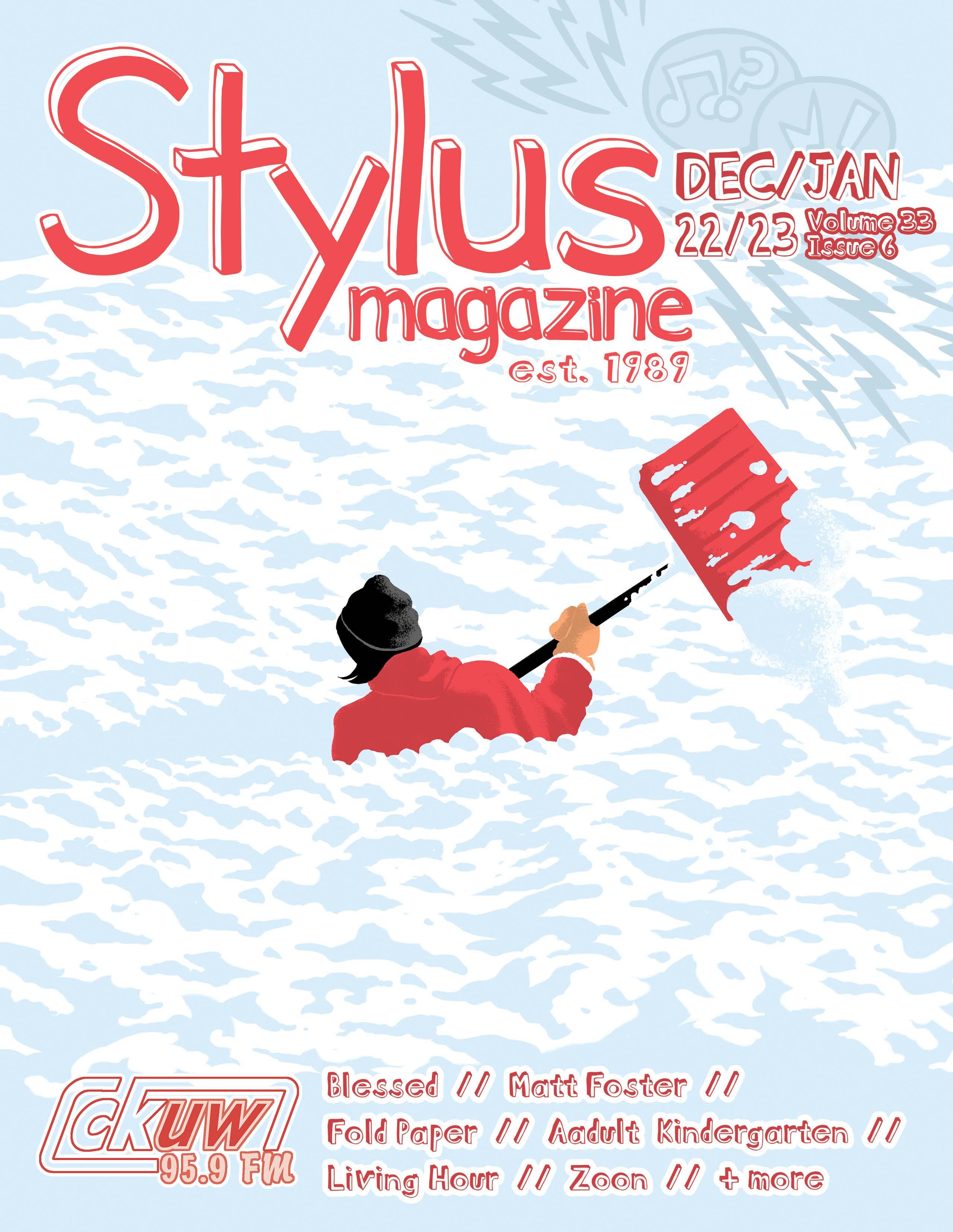
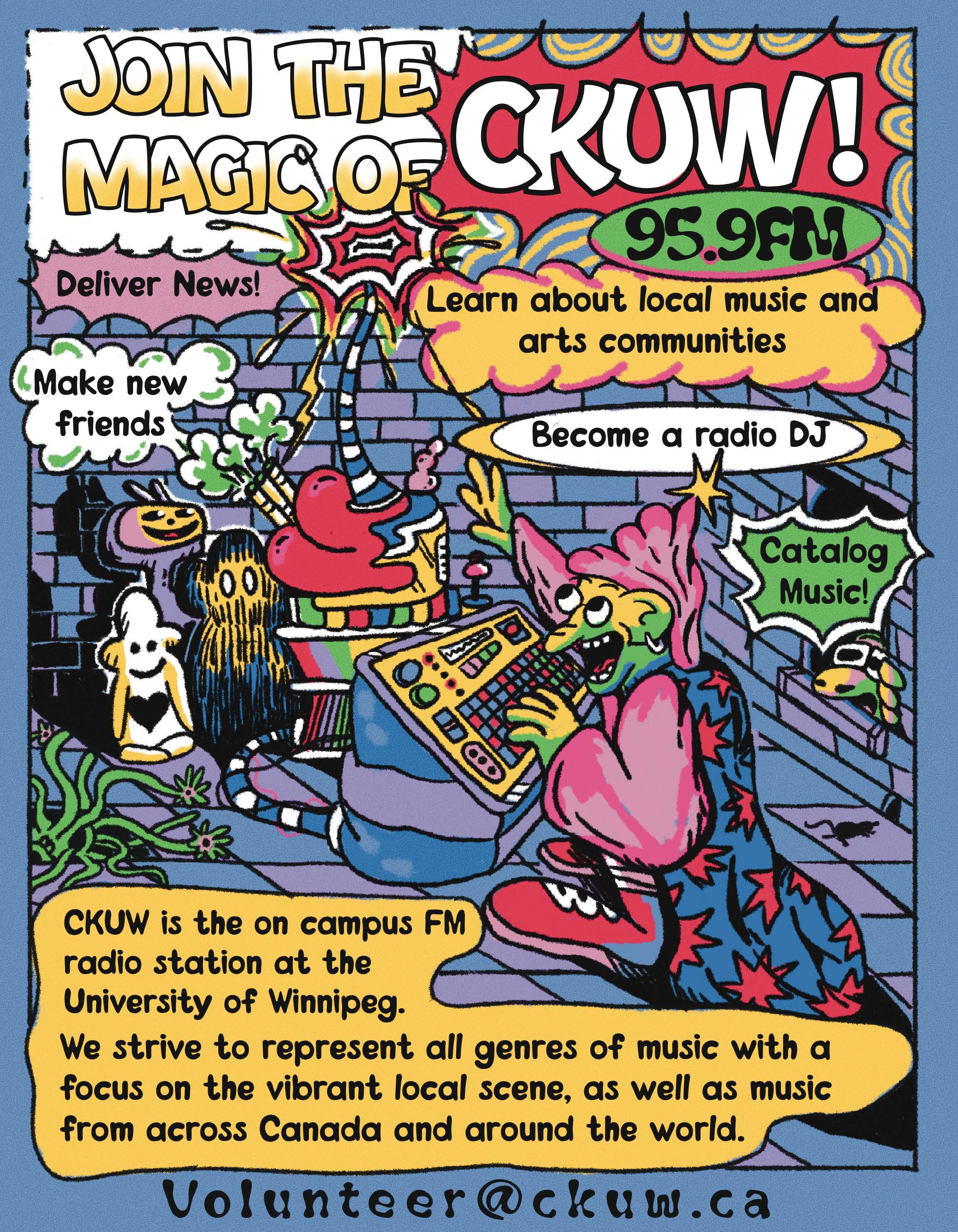
Stylus is published bi–monthly by CKUW 95 9 FM, with a circulation of 2,500 Stylus serves as the program guide to 95 .9FM CKUW and will reflect the many musical communities it supports within Winnipeg and beyond Stylus strives to provide coverage of music that is not normally written about in the mainstream media Stylus acts as a vehicle for the work of new writers, photographers and artists, including members of the University of Winnipeg, of CKUW and of the Winnipeg community at large Stylus reserves the right to refuse to print material, specifically, that of a racist, homophobic or sexist nature . All submissions may be edited and become the property of Stylus All opinions expressed in Stylus are those of the contributors and do not necessarily reflect those of the editors
Contributions in the form of articles, reviews, letters, photos and graphics are welcome and should be sent with contact information to:
Stylus Magazine
Bulman Student Centre, University of Winnipeg 515 Portage Avenue, Winnipeg, MB, R3B 2E9
Phone: 204-786-9785, Fax: 204-783-7080
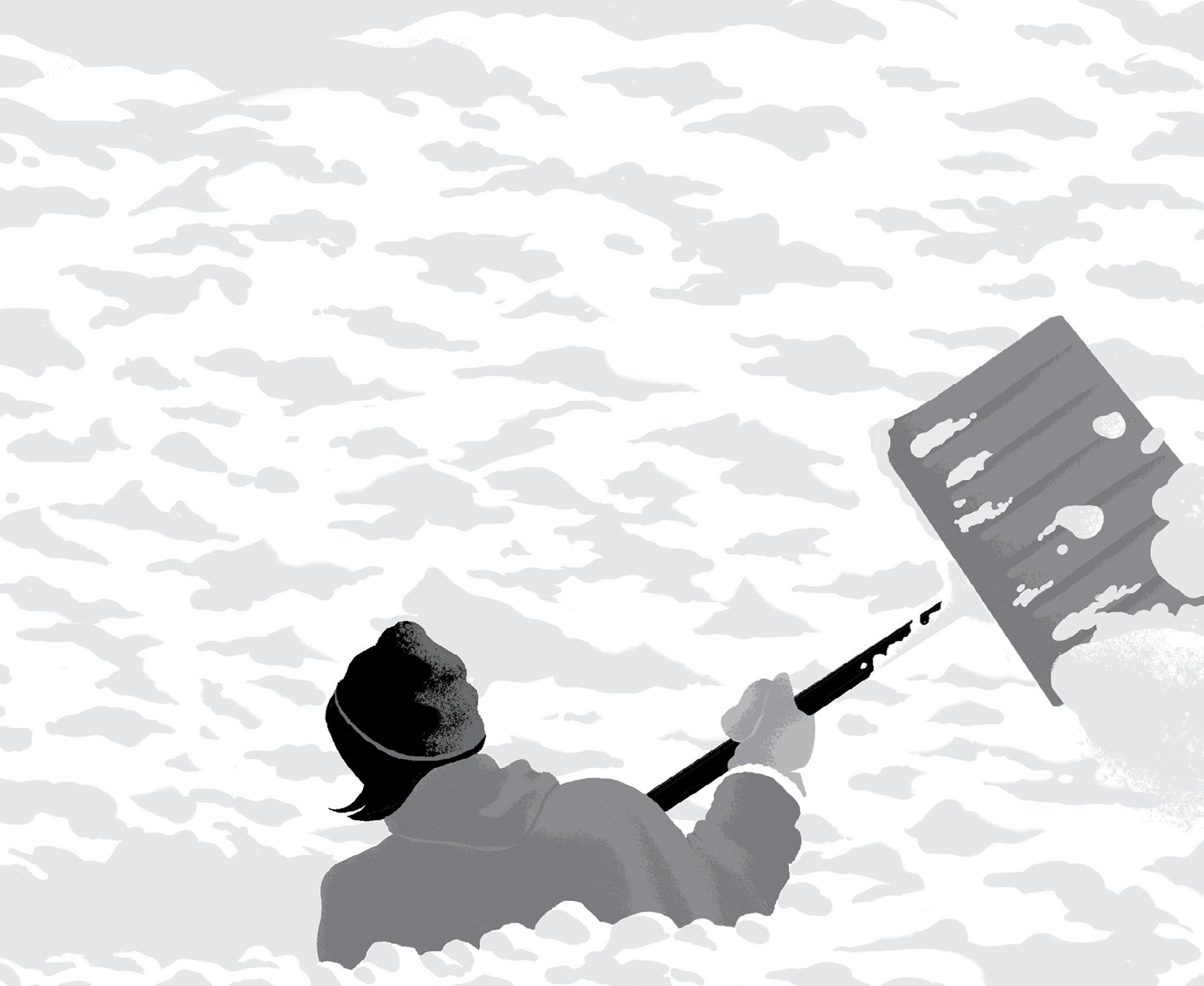
Writing submissions: editor@stylusmagazine ca Graphics submissions: design@stylusmagazine ca
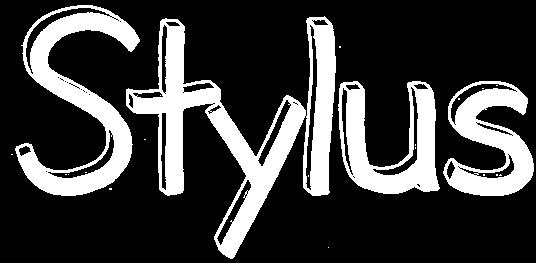
www .stylusmagazine .ca
Contributions will be accepted in the body of an email No attachments please All submissions may be edited and become the property of Stylus Unauthorized reproduction of any portion of Stylus is strongly discouraged without the express written consent of the editors
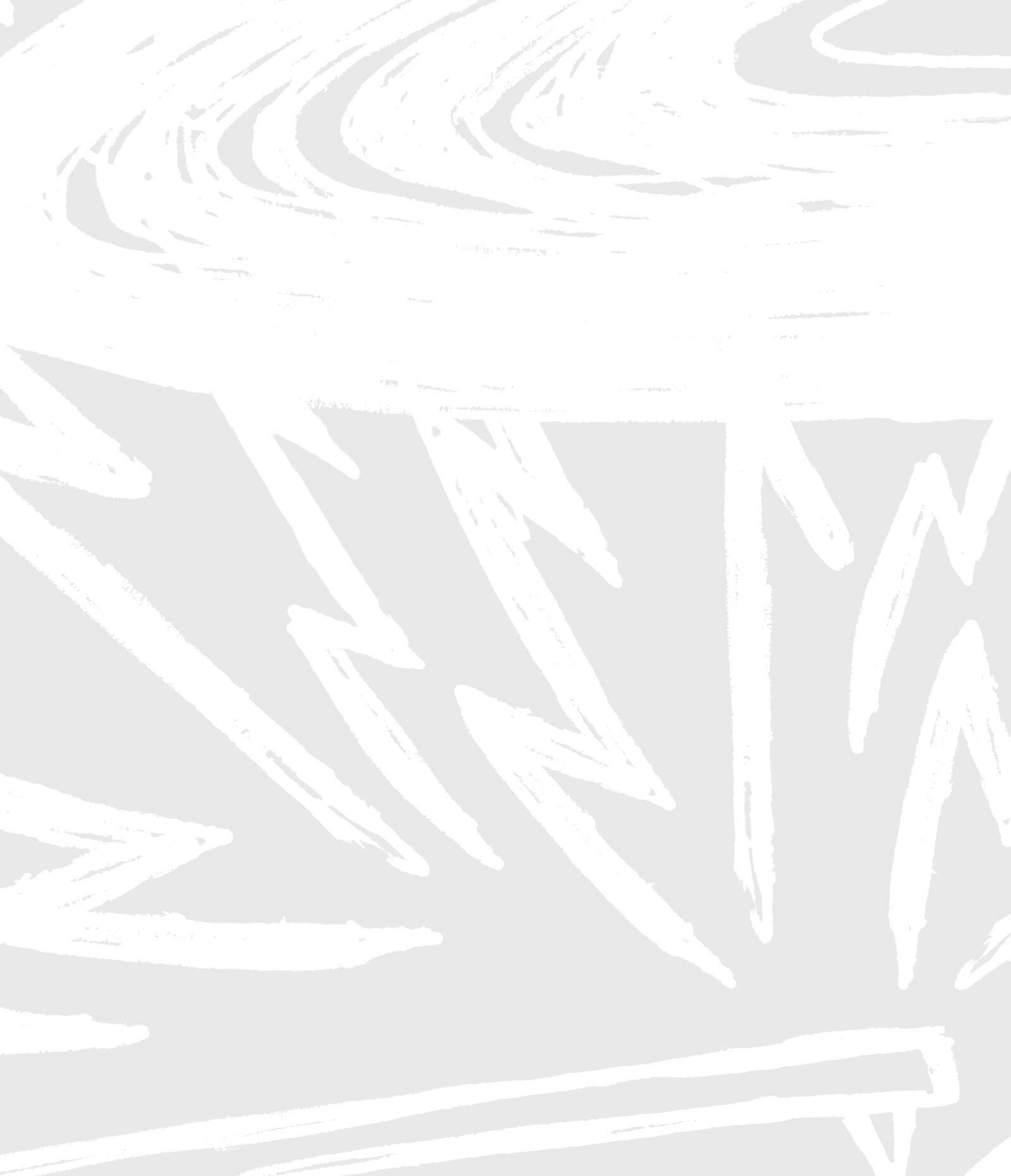
www.ckuw.ca/stylus December 2022 / January 2023 Stylus Magazine 01 Table of Contents Blah Blah Blah: Live Music Happenings . . . . . . . . . . . . . . . . . . . . . . . 02 CKUW Program Guide . . . . . . . . . . . . . . . . . . . . . . . . . . . . . . . . . . 07 CKUWho: Adult Kindergarten with Jeffrey Peeling . . . . . . . . . . . . . . . . . . 08 Local Releases: Living Hour, Zoon, Amos the Kid . . . . . . . . . . . . . . . . 09 JONATHAN DYCK is an illustrator and designer based in Treaty 1 territory. His graphic novel, Shelterbelts, was published by Conundrum Press in May 2022. On the Cover Editor Keeley Braunstein-Black editor@stylusmagazine ca Assistant Editor . . . . . . . . . Myles Tiessen assistanteditor@stylusmagazine ca Art Director Kelly Campbell design@stylusmagazine ca Cover Art . . . . . . . . . . . . Jonathan Dyck Advertising Contact Rob Schmidt manager@ckuw ca Print by JRS Print Services . 204-232-3558 Rish Hanco Jakob Sheppard Jesse Popeski Jen Doerksen Noah Cain Daniel Kussy Contributors Production Team
Circuitous Album Realse Live Show Review 03 Album Interview: Matt Foster: True Needs 04 Interview: Fold Paper 06 Features VOL 33 NO. 6 DEC/JAN 22/23
Blah Blah Bla h

Live Music Happenings

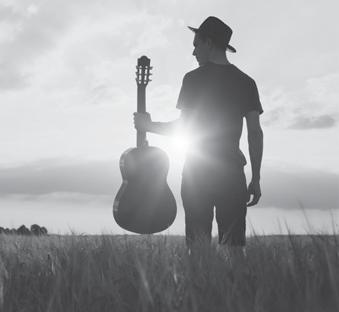



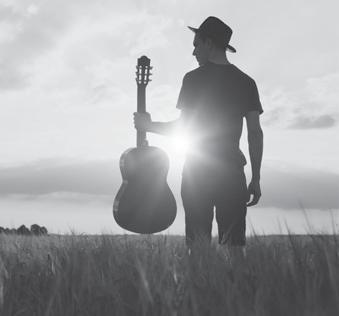
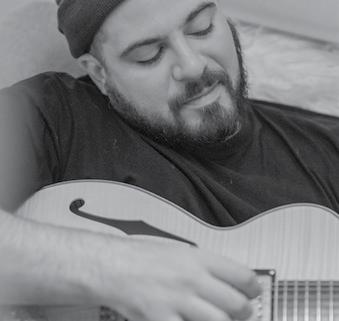
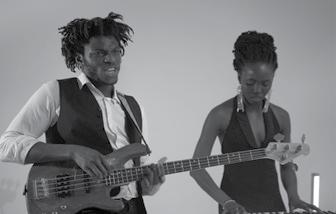
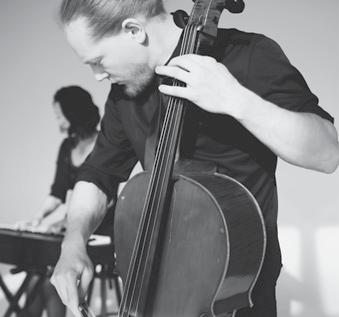

*** Lounge FM + Leossa+Bluebloods Dec. 16 at the Good Will *** The Honeysliders + Fortune Block Dec. 16 at Times Change(d) *** LLUX + Jupiter Meltdown + Carlo Capobianco Dec. 17 at the Handsome Daughter *** The Small Glories Dec. 17 at the West End Cultral Centre *** Whitehorse Dec. 21 at Times Change(d) *** Sean Burns And Lost Country Dec. 22 at Times Change(d) *** Red Moon Road Dec. 22 at the West End Cultural Centre *** Merin + Warming + Animal Teeth Dec. 23 at the Good Will *** Andrew Neville and The Poor Choices Dec. 23 at Times Change(d) *** The Sorels + Bloc Parents + Mod Night Dec. 28 at Times Change(d) ***Juliens Daughter + Veneer + Polyglots + Syd Bomek Dec. 29 at the Good Will *** The Windups Dec. 30 at Times Change(d) ***The Funky Miracles with Fontine and DJ Hunnicutt Dec. 31 at The Good Will *** JD Edwards Band + The Dap Queens Dec. 31 at Times Change(d) *** Hot &

Dirty New Years Eve Dance Party Dec. 31 at the Park Theatre *** Mariachi Ghost Jan. 7 at Times Change(d) *** Times Change(d) Anniversary Celebration Jan. 12-14 *** Jacob Brodovsky Jan. 19 at the West End Cultural Centre *** Janis Joplin 80th Birthday Bash feat. Jenny Foidart and Friends Jan. 19 at Times Change(d) *** The Prairie Town Basement Sessions Jan. 19 at the Park Theatre *** Lucinda Williams 70th Birthday Soiree feat. Romi Mayes and Friends Jan. 26 at Times Change(d) *** A Tribute to Joe Strummer & the Clash Feb. 3 at the Park Theatre *** Mad Caddies Feb. 26 at the Park Theatre ***
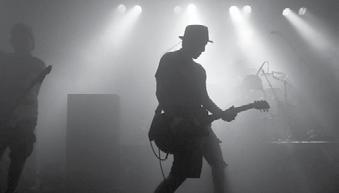
WINTERRUPTION

*** Porches + Living Hour Jan 20 at the Rec Room *** PIERRE KWENDERS + DR. HENRY Jan. 25 the West End Cultural Centre *** Motherhood + Virgo Rising + Bedtime Jan
26 at the Good Will *** ROUND DANCE with FAWN WOOD & DALLAS WASKAHAT Jan. 27 at the West End Cultural Centre *** Cassidy Mann + Kris Ulrich + Taylor Jackson Jan 27 at the Handsome Daughter *** KORNBREAD JETÉ + THE BANNOCK BABES Jan. 27 at the Park Theatre *** RIPPING SAGE with BOOGEY THE BEAT + MATT MAC + THE KAPTAIN + TOPPLEGANGER Jan. 28 at the West End Cultural Centre *** KID FILTHY + LEN BOWEN + BBS STEVE + SONNY DARKO Jan. 28 at the Handsome Daughter *** JASMYN + JAYWOOD + CARLO CAPOBIANCO + DJ SWEET BILLY HEAT+ DJ KOOL J RANCH Jan. 28 at the Good Will Social Club *** JOE & THE SHITBOYS + SGT. PAPERS Jan. 29 at the West End Cultural Centre *** MAUVEY + MOOKI Jan. 29 at the Handsome Daughter *** HOLY FUCK + FOLD PAPER Jan. 29 at the Good Will

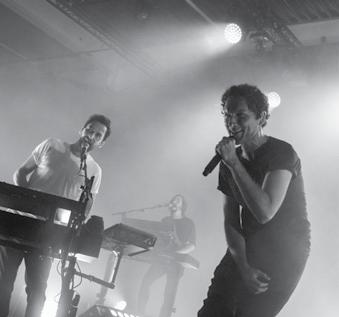
02 Stylus Magazine December 2022 / January 2023
Circuitous album release
As the icy Winter wind whipped down Portage Avenue on November 17, a crowd of eager, cigarette-inhaling, primarily 20-somethings packed into the back of the Good Will Social Club for a night of post-punk brilliance.

Headliners Blessed — who had recently released their outstanding and anomalous new album Circuitous — were joined by underrated scene legends Stuck and Winnipeg newcomer Fold Paper for a night of effects-laden angular guitar rock that shook the entire building with unrelenting determination.
Fold Paper
Fold Paper, an up-and-coming but already local favorite led by Chell Osuntade, was making their debut live performance and kicked the show off with an atomic-level bang. Consisting of members of Merin, Conduct, and more, the band is no strangers to the stage. Osuntade himself plays with JayWood, is a member of Julien’s Daughter, and is well-versed in the local music circuit. As they took the stage, the already nearly packed venue was filled with a cacophony of shouts from a crowd eager to hear the next big thing in Canadian post-punk. Despite the members’ collective experience, Fold Paper admittedly had to shake off those ‘firstshow nerves.’ But, by the third song, they sounded wickedly strong and were living up to the esteem their fans so clearly felt them capable of.
As they transitioned between original material and covers, it became clear just how intimately and energetically Osuntade believes in the power of post-punk. He continually mentioned how honored he was to open for seasoned bands like Blessed and Stuck and exalted the greatness of the artists he covered. He laughed as he described the first time he heard Deadladen, then after the band was finished tuning their guitars while their pedal boards buzzed, dove headfirst into a high-octane version of “Fit For Work.”
“This next one is gonna be loud. I hope you have earplugs,” said Osuntade before Fold Paper’s closing song. A wonderfully deranged version of “RANKS” then flooded the speakers, engulfing the crowd in a whirlwind of borderline punk rock.

Stuck
Stuck never spends too much time away from Winnipeg before returning. The Chicago legends performed at this past year’s Real Love Summer Fest in Teulon, which they said was one of the best shows they’ve ever played, and are now back, in quick succession, to once again blow the minds of an increasingly large crowd.
The genre veterans tore through their set at a loud and fast pace. Their impenetrable technical abilities were performed with such ease and confidence it might have been easy to miss if not for the glowing wall of fuzz bouncing in your skull. Stuck performed many tracks from their latest EP, Content That Makes You Feel Good, which features angular guitar riffs, reflective social commentary, and a whole lot of flaming noise. The intensity of the delay-riddled set increased at the same rapid pace as the bands’ sweat and as their last few songs became further experimental.
While it’s easy to crank the gain, reverb, and hit a few pedals, Stuck made their unique strain of noise radiate like the sun beaming through the stainedglass windows of a nuclear power plant. They proved to be one of the best and most creative bands working in the post-punk arena today.
Blessed
Awash in a bath of red light, Blessed took to the stage late into the night to perform (mostly) new songs from their carefully curated, masterful album Circuitous While any sort of knowledge of colour theory will tell you red evokes negative, violent emotions, it can also represent passion, love, and in the case of ancient Egyptians, to prevent danger. An enigmatic color like red makes total sense for an album so unfathomably rich in detail and meaning.
The band spoke to the crowd minimally at the start of the set, warning the audience of the upcoming lack of engagement. While vocalist Drew Riekman was mostly apologetic in his statement, he might as well have been saying: “Hey, watch this…” because what followed was enrapturing. Listening to Blessed expertly maneuver their way through the complicated, dense tracks of Circuitous over the next almost hour-long set was hypnotic.
The effects-heavy set dipped between post-punk, math-rock, indie, and prog, never settling in a comfortable pattern but felt anchored by the chemistry and talent of the band members. Blessed made interesting changes to some of their material; where Circuitous goes quiet in songs, Blessed played them loud and abrasively; their performance was dramatic, intoxicating, and extremely innovative.
The now semi-Winnipeggers created one of the best alternative rock albums of 2022. The spell-binding riffs, contemplative lyrics, and mature tone rewards listen after listen, and it felt like a wonder to watch them launch Circuitous in eloquent style.
www.ckuw.ca/stylus December 2022 / January 2023 Stylus Magazine 03
Feat. Blessed, Stuck, Fold Paper
MYLES TIESSEN
BLESSED AT THE GOOD WILL NOV 17, 2022
PHOTO: MYLES TIESSEN
Stylus: You have your take on “Billy in the Low Ground” on the album and fingerpicking guitar on songs like “Don’t Lie About Your Dreams” How does folk music fit into the picture?

Matt Foster: Protest music would’ve been how I found folk music. The power of bringing people together, politically throwing a wrench in the gears. There are all kinds of things in folk music that I love, how you don’t have to be good in terms of playing to get up on the stage; it’s very equalizing; it’s everyone’s music. In terms of direct influences, I don’t pull on it directly. Live, I’ll slow “Billy in the Low Ground” down and play a crooked version. I’ll reference the tune, but I’ll play the B section first, I’ll play it super slow. No one plays fiddle music really slow; everyone’s racing to be that athlete. But if I just let the strings ring, let them create chords in the sustained spots, there’s a beautiful harmonic sadness. I try hard not to define anything lyrically, harmonically, I try not to let anything get boxed in, so the ear settles - I like this sense of the unsettled.

S: How do you communicate these unsettled arrangements with your band?
MF: Take “Hospital,” a song about assisted suicide and the idea of passing on. I wanted there to be this feeling of the other side, whatever’s beyond the veil, as a constant presence in the song. I want it to feel a little wobbly like there are almost two things happening at once, not just what’s happening now, but also everything that’s not happening right now, occurring simultaneously. One of the characters in the song is very close to being gone, and there’s a choice of how the last moments are going to be. It’s not threatening, not looming…the rest of the record, there are these darknesses that are creaking and grinding, but in “Hospital”, I wanted a similar presence but to levitate, with relief and this lifting. So that might be, ‘can you suspend a two like a drone through the whole song?’ So the one and the two create this wobble. It’s such a simple song, and the chords just go back and forth, but it doesn’t resolve.

There are moments like that where I’m asking for very specific things. And also just sharing and inviting people to stew in it long enough to get the vision, and then we start speaking the same language. I’m not standing over everyone and telling them what to play; Quintin knows a lot more about
playing the hurdy-gurdy than I do! I might say, ‘what’s the worst sound you can make?’ I try to egg him on to find the corners of the instrument.
And similarly, with the upright bass, I was researching what the weirdest strokes were, like col legno tratto, where you turn your bow over and you’re playing it with the wooden part of your bow, or when you’re actually striking bouncing it, and you can get a rhythmic bounce, or when you’re playing the line, you’re actually bowing with the wood of the bow. What I love about these strokes is that a good player that otherwise has incredible control of the instrument when they play with this terrible-sounding piece of wood…the notes are all there, but the instance of tone is a struggle. This music is barely here, dying to be here, and almost doesn’t get to.
S: “Hospital” sounds intimate and personal; does a song need to be autobiographical to be meaningful?
MF: No song I write is cut and dry, a scenario in my life. It starts with some sort of insight about a
04 Stylus Magazine December 2022 / January 2023
Album Interview : Matt Foster :: True Needs
JESSE POPESKI
PHOTO: JEN DOERKSEN
relationship or a moment. I ruminate on it, I get in there through that, but then the writing is about removing myself out of it, so I can see all the truths or possibilities and try not to exclude any of them. If I’m specific in imagery, I take the approach of it being a page in a novel, and you’re going to come into it not understanding the beginning, and you’re going to leave before you understand the end. It’s going to be a vignette where you get characters, and whatever I’m saying is only so important as whatever I’m not saying. If I say something and it sounds like I’m being too clear, I feel like I’m writing about myself.
S: What’s wrong with writing about yourself?
MF: Those aren’t the ones that stick around. In the long run, talking about myself doesn’t feel like what I’m in there to do. Just by virtue of the fact of opening my mouth, I’m talking about myself, so I don’t feel too attached to my viewpoint.
I’m really scared of recording anything or even writing it down. I just started using a cell phone to capture ideas; in the past, I would’ve been too scared to crystallize things. I wouldn’t write anything down until I had the song from start to finish, and I would play it hundreds of times. And when I was confident that that was the way it goes, I could write it down. It was debilitating. You can only write so many songs at a time like that. I would especially not record it; I was so scared of capturing it the wrong way. Once you record it or write it down, the act itself freezes the possibilities of what it could be. When it’s unrecorded, it’s still in that infinity situation, any change can be made.
What I’ve carried through to the present process is that I don’t want anything to feel too locked down. It’s more true of our physical reality - like quantum physics. Anything that’s here in a material sense, when you go down to the smallest observable or calculable level, nothing’s actually here permanently, it’s popping in and out - things are only here on average, and that’s a more true representation. The truth is things aren’t really here, and if they are here, they’re also somewhere else. I try to reflect that in the delivery, in the tone, and the way I make music.
As soon as you open your mouth, you’re wrong. Whatever you’re trying to sing about, the moment you say it, you’ve missed all the other ways you could’ve said it. But you have to commit to something if you’re going to say it at all, so you start on a path, and along the way, you allow that you’re also wrong. So you build that into the music and the writing.
S: When I think about the sound of the recording, words like immediate and intimate come to mind How did you achieve that sound?
MF: In the studio, it’s an opportunity to do a magic trick, to have the listener’s ear up to a ceramic wheel
rubbing against this gut string, you put a mic in front of it and find that sweet spot where you’re creating a whisper. The whispered elements can be the protagonists, and all the pounded, banging instruments are tucked way down in supporting roles. I like inverting those power dynamics, letting the quiet and meek be the voice and then the power and heaviness mixed in a way that it’s the scenery for the protagonists to walk into.
S: The drums are interesting - they’re mostly panned to one side, and there are few, if any, cymbals
MF: In a rock band, the cymbals cut through, all that bright quality - it’s a frequency that is tiring, and everybody’s instruments are fighting for that space, so I get the cymbals out of there. The strings on my guitar are three years old! I try not to be scared to use the stereo mix in an old-school way. If you listen to something like Johnny Cash, the whole kit and even the bass are on the left, and each element is its own character, accommodating each other.
S: Why did you choose to include two instrumentals on the album?
MF: They were just made while I was making the record. For “From a Poplar Near the Hayland,” I found a field recording, a vinyl LP from the thrift store, and had it playing in the other room and was mucking around with some chords, and then this sad goose comes in syncopated over the chords I was playing. It was soooo sad. I’d never heard a goose be so sad. But it was also groovy, I had to laugh almost. It was so accidental, unintentional, and the power of that chance feeling, I couldn’t let it go, so it made it onto the record.
“Dream” is a guitar exploration that I found. I kept trying to put words to it, and the more I said, the less I was saying. I had lyrics that wanted to be in there, so I ended up recording it through gear that make them disappear, and there’s a reprise buried in the Roland space echo so that what comes back is just the echo, the tape swishing around and feeding back, so instead of my voice coming back it’s the dying echo of the machine.
S: You’ve done production for other artists . How do you see that role?
MF: I discover it in each scenario, and it’s different from case to case. If someone wanted me to come in and run the show, we would’ve ended up with different records than what we made. The happy place we found is meeting each other in the middle. Putting the right team of people together, knowing the artist like a good friend, knowing the music, having conversations about it, trying to translate from their vision to the engineer to the session musicians. A friend from the business world said,
‘you’d be classified on the assets ledger as the intangibles.’ I really like that.
Leonard Sumner didn’t want to play guitar on this record, so how do we start from his feeling, lift it away from his hands into a band but retain his spirit? The music is flooring, I can’t believe I get to make music with a friend like that. In the end, it was a lot of work, and I love what we made.
With Slow Spirit, these people can run circles around me musically, but it’s about being a sounding board, trusting each other’s opinions. Eric told me he wanted me to make sure they were emotionally on track as we go through the process. The attitude is we’re going to get two songs done today, and in between the takes, we’re going to hang out, make food, joke around, love each other, and be in each other’s company so that by the time we hit record, we’re grounded. When we’ve done that emotional work, the music plays together because everyone’s connected - we’re not dropping in at 6 p.m. after work and slamming a song out and ‘see you later’ because we’ve all got our lives to get to. It’s about slowing down. When you’re not recording, you’re making the record just as much as when you are.
S: How do you feel now that your record is out?
MF: I like the idea of an author putting out a book on release day. The launch of an album now is reduced to the click of a button, and you’re alone, you hit send. Your pocket lights up a few times, and people sending some congrats, but ultimately you feel alone. I didn’t put on a show or big gathering, I didn’t want to get on stage before anyone’s heard any of the stuff and try to compel everyone to be into it. It’s like putting out a book because no one can consume it in a day. They have to take it home in their own private space and read it to themselves, and have their own relationship to it. You put out something for a moment, it’s not a big climax like your ego wants it to be. It might be a birth, but it might be more of a planting into the ground, a beginning.
I feel scraped out. The night it came out, I was hanging out with some friends, and we were trading new songs back and forth, playing new music for each other on the day my record came out, and it felt so appropriate. All of a sudden, there was this room; I can make another one now.
It’s such a lonely endeavour to make music and feel like ‘I have to do this,’ and not know exactly why. I don’t know. You turn a lot of time towards it.


www.ckuw.ca/stylus December 2022 / January 2023 Stylus Magazine 05
Interview: Fold Paper
RISH HANCO
Fold Paper is the new project from Chell Osuntade, a Michigan native who moved to Winnipeg in 2016, and has been embedded in the local music scene ever since.
Chell sat down to talk to us about Fold Paper and his journey with music. He discusses his influences, his passion for the post-punk genre, and playing music with his friends.
This interview has been edited for conciseness and clarity.
STYLUS: Do you want to talk about what you’re working on right now?

CHELL: Will and Art — they run Collector Studio — I’ve become friends with them in the last couple years. Their first band, my other band, Julien’s
a fulfilling experience to have other people there with you. I remember I got into such a rut. After I’d record on GarageBand it would just be there, and I would spend so long on it too, it’s tiring my ears out. I was like, “Is this really going to pan out to anything?” But then playing it live with other bands was like, “This is going to be so cool.” And it’s my friends, people that I know in the scene already. I have Jordan Cayer from Merin, Jordan also plays in Amos The Kid, Reed Forrest from MoyaMoya, and then I have Rob Gardiner from Conduct. I remember I saw Conduct maybe a year or two ago, and I remember watching the drummer, Rob, and I was like, “I need that.” Immediately after their show I went up and I was like, “Yo what’s good, I’m Chell, I think I’m in love with you.” He’s such a good drummer, I love watching him. We chatted that day, I think we added each other on instagram
it publicly until I moved to Winnipeg. When I moved here in 2016, I joined a band called Arenas. I actually met them on an app called BandMix. It was two brothers, Mike Scott and Chris Scott. That’s when I started to get into the scene, that’s when I met the Real Love [Summer Fest] guys, that’s when I met Jeremy from JayWood. After Arenas I met my friend Emma Murphy. She shot me a message on Facebook because she found my profile on BandMix. So we created Julien’s Daughter, then I started to get into a lot of harder rock, got into more alternative music, then turned to post-punk. When I found the post-punk genre, that’s when my eyes really opened and I was like, “Oh yeah, this is what I want to do.” Mike Scott gave me a lot of bands to listen to. One band that really kicked it off for me is Black Midi. [Mike] sent me this clip from one of their songs called “Talking Heads.” That really pushed me into the deep end of post-punk. Another one of my favourite post-punk bands is Unschooling. Huge influence on my post-punk and on my writing post-punk.

S: Do any of your country music favourites influence your writing now?
C: I don’t think directly but I think it taught me so much. Country is a genre that is so rooted in the basics of musics. It’s such a basic genre where there’s all these general chord shapes and these general chord progressions. I think one thing it really taught me was to write music that draws a certain kind of feeling from the listener. I think that does influence what I do now, like I said not directly, but I feel like I know how to get what I want to get from what I’m making.
S: When you’re writing now is that a goal that you have? Are you like, “I’m going to write this song because I want someone to feel sad when they listen to it?”
Daughter, recorded their album two or three years ago. I’ve been hanging around them a lot recently, so we decided to take on Fold Paper. We’re going in on Nov. 10 and we’re going to start recording. We’re working on a single first just to kick it off. That’ll be the first thing I ever worked on as Fold Paper, except for my demos.
S: So this is all music that you’ve written and now you’re gathering your friends together to play it?
C: Exactly. It usually starts with me getting an idea, I record it on my phone and then I spend a day, maybe a few hours, just sitting on GarageBand and recording the guitar, recording the bass, midiing the drums. It’s been a fun experience teaching myself to do that. Now it’s like flipping over the table and actually going into the studio to record. It’s nerve-racking but I’m pretty excited. It’s such
and then later in the year I was like, “My project’s coming together, do you want to drum for me?” and he was like, “Yeah.”
S: How did you get into music?
C: When I was young I used to listen to country music. I had this little radio and it would blast country music 365, for three or four years straight. That was a huge influence, for me, and that evolved into listening to other kinds of music. I went from country to indie rock. Lots of Vampire Weekend, Two Door Cinema Club, Bombay Bicycle Club. I went from listening and enjoying these bands to wanting to play their songs. My parents bought me a guitar and I started playing. I learned to play my favourite songs and I started realizing that I really liked the bass lines. I tried to learn them on my guitar and it wasn’t working really well, so then my parents bought me a bass. I didn’t really start doing
C: Sometimes, yes. But most of the time with what I’ve done so far, what I’ve created so far, it happens mostly in the shower when I can’t get out and do anything with it. I’ve taught myself to kind of keep it in my head until I get out, then I can get on my guitar, put it down. Most of the time that’s how I create what I create, and then I find that I can turn it into what I want. I’ll be like, “Okay now I have this random idea, what do I want to associate with it? What do I want to make people feel? Do I want to make people dance? What do I want to turn this into?”
S: When you’re writing music are you considering how this is going to sound live or what the experience is going to be of a live audience?
C: That is exactly what’s always in my head. I’ll never picture recording this in-studio or putting the song out. I’ll always picture myself on stage playing. I
06 Stylus Magazine December 2022 / January 2023
FOLD PAPER AT THE GOOD WILL NOV 17, 2022
PHOTO: MYLES TIESSEN
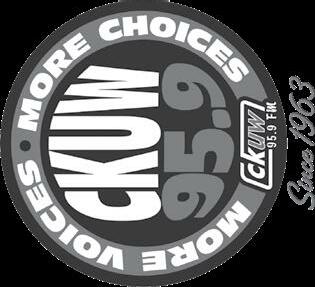
www.ckuw.ca/stylus December 2022 / January 2023 Stylus Magazine 07 6AM 7AM 8AM 9AM 10AM 11AM NOON 1PM 2PM 3PM 4PM 5PM 6PM 7PM 8PM 9PM 10PM 11PM MIDNIGHT 1AM 2AM 3AM 4AM 5AM 6AM MONDAY TUESDAY WEDNESDAY THURSDAY FRIDAY SATURDAY SUNDAY MUSIC LOCAL SPOKEN WORD SPOKEN WORD DEPARTMENT 13 POP /ROCK C�M�D�O�O�O�I�A� R�P�R� outSPOKEn Truth Before Reconciliation The Sentinel's Marvellous Kaleidoscope WINGS The Freedom Principle World Music Worldbeat Canada Radio Indigenous in Music FanTasTicfRidaY WorldIsland Music WWW.CKUW.CA OFFICE: 204-786-9782 NEWS DESK : 204- 786-9998 ON AIR: 204-774-6877 FAX: 204-783-7080 EMAIL: CKUW@UWINNIPEG.CA VOYAGE (Jazz) THE GREEN MAJORITY ALTERNATIVE RADIO The Meta World Stoopaloop Show Deep Threes Viewpoints !EARSHOT DAILY BINKY PINDER'S FUNHOUSE TICKLE MY FANCY Blues SQUAREWAVE VIDEO GAME MUSIC AND HISTORY SPACE CADET MUSIC, OUT OF THIS WORLD AMATEUR HOUR So Bad, It’s Good TWANG TRUST Country/ Roots/ Big, Dumb Rock ‘n’ Roll S.A.N.E. * RADIO Local Experimental Music The Coyote Show Indigenous languages and events THE WORLD World THE TONIC Garage, Punk, Surf,and R&R DESTINATION MOON Sock-Hop-A-Go-Go BREAK NORTH RADIO CKUW Album Feature Bluesday On My Way Home (Local Indie) !EARSHOT DAILY MONKEY SPARROW ROMPE (Latin) !EARSHOT DAILY Two Prin ces Adult Kindergarten Dub City Steppers PHASE ONE Electronic SUNNY R OAD Roots Mu sic GLOBAL RESEARCH NEWS HOUR CHECK CA Funky QUADRAFUNK Electric Dance Party S�r�e�K�l�i�z G�n�r�t�o� (Local Hip Hop) THE SATURDAY MORNING SHOW DEAD MEDIUM MUD PUDDLE RADIO For Kids (Adults too) THE ELECTRIC CHAIR TEMPLE TENT REVIVAL THE IVORY TOWER Eclectic Mix Eclectic Residents THE TRIP PSYCHADELIC ROCK WE BUILD HITS Hip-Hop RED BOX Hip-Hop DANCE HALL FEVER Dancehall and Reggae ISLAND VIBES Caribbean THE GASHLYCRUMB TINIES ALTER- NATING WEEK THE C.A.R.P. The Completely Asinine Radio Program BOOTS & SADDLE Active Voice NEON BEIGE SOUND EXCHANGE Medicine Wheel of Music SHADES OF CLASSICS Classical and New Age CKU-Speaks METAL MONDAY AMPLIFIED RADIO NIGHT DANGER RADIO BACKBEAT THE WONDERFUL & FRIGHTENING WORLD OF PATRICK MICHALISHYN MANITOBA MOON Your Show Here Rainbow Country 12 6 8 9 12 M ORNING BREATH ACCESSIBILITY MATTERS SEAN SHOW (Local music) MODERN JAZZ TODAY LISTENING PLEASURES The Motherland Infl uence NO FIXED ADDRESS Lived Experiences of Homelessness HOW TO SURVIVE A TORNADO YOU CAN'T HIDE FROM GOD Gospel This is Hell is Way Out Winnipeg Arena is on Fire Meta World Stoopaloop ShowReplay BRIDGING THE GAP DOLLAR COUNTRY WINNIPEG ARENA IS ON FIRE REPLAY CANQUEER THE HOW DO YOU DO REVUE GIRLIE SO GROOVIE Some programs are on hiatus and/or airing different content due to university closure for COVID-19. Behind the News with Doug Henwood PAGES EAT YOUR ARTS & VEGETABLES TAWNY, THE BRAVE Pop/Rock Temporary Programming !EARSHOT DAILY H�r�e�e�t� S�r L� T�u�d�a R�V�L�T�O� R�C� FrAÑOL New shows are marked with a starLive shows are marked with a lightning boltThe Phil-In Show The Stuph File Wooden Spoons GROUNDSWELL The Vulcan's Hold (Trip Hop) Talking Radical Radio FreE city Radio DEMOCRACY NOW! DEMOCRACY NOW! Your Show Here Making Contact After Thought Harbinger Media Hour The World News, spoken word BARKING DOG Shortwave Report CounterSpin Folk Roots Radio SYSTEM KIDZ YOUTH IN CARE LET'S PLAY DJ! B�R�I�G D�G Past 'n Present Folk 'n Roots
always picture what the audience will be doing while I’m playing so that pushes a lot of it, a lot of what I write. If there was a way that I didn’t ever have to go into a studio I would do it, but it doesn’t make any sense to not record your shit because people would want to listen to it other than just seeing you live. That is usually the goal, to get on stage and play. It’s not like I hate recording, but that’s the second thing.

S: What is one of your best or worst live show experiences?
C: I think my favourite show to date would be the JayWood album release show we just played a couple weeks ago, that was a really fun show. A lot of people came out. The audience almost made us cry on stage. JayWood has a song called “Thank You,” and it was one of the last songs we played.
When we started the song all of a sudden all these pieces of paper went up in the audience and they all said “thank you.” It was very heartfelt, and it was very moving. And the worst show experience… I don’t know. There’s never really a show you hate, I love being on stage, I love playing. Julien’s Daughter had kind of a weird show a few months ago, it was at the Handsome Daughter. It was our first show back after a while, and we actually practiced a lot for it too, so I don’t know why it went so rough. We were forgetting parts. I’ve learned now that we’re harder on ourselves than anyone else is, and something it also taught me is, whatever’s happening on stage, you should never call yourself out. I kind of did that while we were on stage there, which I really regret, but again it’s a learning experience. Everyone was really cool about it, everyone was really sweet. It
CKU Who?
JAKOB SHEPPARD
was almost like they didn’t notice anything, which I realize now that they didn’t. It’s still a show, they’re still having fun.
S: What is it about the Winnipeg music scene that got you into performing and trying to do it professionally?
C: I love the scene. That might be because I haven’t really experienced any other music scene, but I love the Winnipeg music scene and I feel like I’ve gotten so many opportunities. I feel like a lot of that goes back to making connections. That’s something I’m pretty good at, is connecting with people. That’s definitely helped me to get to where I am now. Just be nice to people and always be open, just whatever level you’re at be fucking cool, be a nice person and that’ll get you far.
Adult Kindergarten with Jeffrey Peeling 7:30 - 9 p.m. Thursdays

On the evening of Oct. 25, I was able to sit down with Jeffrey Peeling of Adult Kindergarten and asked him a few questions about his “noisy, psychedelic, dreamy, and spacey mind journey that explores D.I.Y. music from genres as diverse as electronica to noise rock.”
The first thing I had to know was the story behind the name. It is what initially drove me to want to have a conversation with him in the first place. He explained that it comes from a song by Ken Nordine of the same name recorded in 1960. The concept of the track is getting a bunch of non-

musicians together to play household objects such as a vacuum cleaner or a rake. He explained Ken’s philosophy: “There’s not enough time in this lifetime to be an expert in everything, so just do it.” He told me that “music isn’t about technique. It’s about expressionism,” which is his philosophy when running the show.
This is something I can get behind tremendously. Adult Kindergarten broadcasts mainly underground punk and sometimes electronic music.
I next asked him why he decides to play the music that he does. “There’s little planning involved,” he said. “I just want to have the craziest radio show possible.”
He told me that he used to listen to a lot of latenight, underground radio, and that was his biggest inspiration for the sound of his own show.
“I want to appeal to those kids who are under their blankets late at night, listening to something crazy on the radio,” said Jeffrey. I then asked him how he accessed the music he played “98% of the music I play is physical media. I’m a record collector.”
He explained that he generally prefers physical media over digital because it’s more authentic. He
told me that he has a rule where he will not play any hit songs, only underground, underappreciated artists. It quickly became apparent that Jeffrey and his station are all about authenticity and experimentation.
One thing I had to know before ending this discussion was any tips that he may have for an upand-coming broadcaster.
“One of the exciting things about campus radio is it’s not professional; it’s something that anyone in the community can do,” said Jeffrey.
This philosophy is extremely welcoming, especially in a culture that can sometimes be exclusionary and elitist in nature.
“I’ve met new volunteers who just agonize over every audio mistake they make on air, but I think that’s part of the atmosphere and part of the joy of campus radio,” said Jeffrey.
His point was that perfection is impossible and should not be strived for. “It’s just real people, and they’re just playing music that they love.”
One of the last questions I asked him before we went our separate ways was if he had any regrets when it came to the show. He went on to explain that besides a few recording issues or maybe sometimes when he was hemming and hawing on air earlier in his career that he didn’t.
“There’s no difference listening to this show than if you came to my apartment, sat down, and listened to records with me - it’s just a big record club that’s on air,” said Jeffrey.
This was my main takeaway from Jeffery and Adult Kindergarten as a whole. A person’s technical ability or skill doesn’t really matter when it comes to music appreciation. What matters is their love and dedication to the hobby.
ZOON STERLING MURMURATION


“…this body of work is supposed to display the danger in isolating. While in this state, we set ourselves up to be in harm’s way by outside forces, but breaking out and embracing humility and community, you can finally transcend into a healthy trajectory.”
So writes Zoon’s Daniel Monkman in the press release for their surprise EP Sterling Murmuration.
The Toronto-based shoegazer’s journey exploring the fringes of rock music is boundless in creativity. It often taps into a particular emotional resonance that only exists in the sonic cosmology of their discography.
As a companion piece to Big Pharma — an EP released earlier this year on National Indigenous Peoples Day — Sterling Murmuration is a collection of songs, sounds, and poetry originally written and recorded by Monkman over a decade ago while they lived in Winnipeg. These four new tracks reflect on the passage of time, decay, retribution, and the death of friends. The listener is lifted into a profoundly unique musical experience as the temporal fuzz of guitars and lush wash of reverb-soaked vocals emit through the airwaves.
Opener “Play Ground” begins with inorganic buzz, unacquainted and directionless in its intentions. It hangs there for a moment, cementing itself as the album’s cornerstone, waiting until the rest of the song builds around it. Precious acoustic guitars swing among themselves until an all-encompassing wave of sound moves you into the glimmering, hallucinogenic light of emblematic shoegaze. “Play Ground” is a song where Monkman lays out the memories of a deceased close friend. The straightforward production in the vein of My Bloody Valentine harkens back to the younger and vulnerable years of summer sunsets, tag on the play structure, and bike rides to 7-Eleven. “Come along to the playground/Don’t play like they used to,” sings Monkman. Rather than sounding forlorn as one might expect, Monkman seems stronger and more
resilient on “Play Ground.” Maybe it’s the knowledge of their collaborative approach to these songs, but Zoon appears to have found that “healthy trajectory” out of tragedy.
Tracks “In the Woods” and “Move” are undoubtedly impactful and brilliant scene-setters. The former is a short instrumental, the latter being a luscious cloud of oscillating acoustic guitar syncopation and harsh feedback pulsating through a buzzy monitor. As intended, these two songs fit together like twins synced up on a swing set. Sharing similar structures of organic guitars layered with haunting soundscapes, they show how Monkman delicately crafts their songs. Like a bricklayer, Monkman stacks blocks of illimitable sounds until the songs are steady and unmovable.
Sterling Murmuration closes off with the riff-intensive “Giizhig.” The pounding drums blast through the mix, and the guitar riff moving through molasses seeps through your skull. We are treated to a similar wall of energy that we get throughout Bleached Wavves but in a stripped-down, more introductory approach. It’s easy to see the connective tissue between these previously unreleased recordings and Bleached Wavves.
In the end, the collection of songs found on Sterling Murmuration feels like conclusions to thoughts and dreams of yesteryear. MYLES TIESSEN
Someday is Today’s sense of nostalgia is intertwined within the tracks as if they sought to manifest the energy invested in their self-titled LP with this matured and road-seasoned lineup. The pounding chorus of “Middle Name,” paired with the explosive intro to “Feelings Meeting,” make for an eyeopening pivot back towards the band’s shoegaze roots, except diving off into the deep end with nods to MBV. Slow burner “Curve,” penned and sung by Adam Soloway, is vulnerable and reflective in its captivating lyrics (Let it multiply/the guilt I feel/is it real?). The satisfaction and warmth that the listener experiences in Gil Carroll’s “Exploding Rain” really highlights the growth of a band, once awash in reverb and fuzz that can emerge stripped of the safety of such layers with such confidence. Such instances of brilliance shine through the instrumentation on “Hump” while Sam Sarty showcases her vocal range.
For Living Hour to open the creative floodgate and remove themselves from the safety net that their dreamy sound has allowed them in the past was a bold move, and it allowed them to create the album they’ve always wanted to make. DANIEL KUSSY For fans of: DIIV, Jay Som, Guided by Voices.
AMOS THE KID I’LL SET THE FIRE
Like other great love songs, “I’ll Set the Fire,” the new single from Amos the Kid, makes you want to feel loved like that. It features frontman Amos Nadlersmith at his most intimate, quiet, and loving.
splashing, fields of green in pattern, landscape hills are scattered in my head.” In the end, the ultimate comfort is in the breath of the beloved: “I can hear you breathing now,” the song repeats. While predominantly about romantic love, “I’ll Set the Fire” also evokes the love that can be felt for a sibling, friend, or parent.
With its pared-back, acoustic guitarled production and almost whispered vocal performance, sung as if to avoid disturbing the quiet of the night beyond the firelight, “I’ll Set the Fire” is a campfire song in the best way. It is a step forward for Amos the Kid, who just re-signed with Winnipeg label House of Wonders, and should provide listeners with a sense of excitement for his next project. NOAH CAIN
MIDDLETIMES MIDDLETIMES EP
I think that this is the type of EP you would dismiss at first. The type that you need to learn how to love. Like those tracks that you always initally skip but then when you actually give it a listen you discover it’s the best song you’ve ever heard in your entire fucking life.
LIVING HOUR

SOMEDAY IS TODAY
Next Door Records
I’ll remember Living Hour’s performance at the Winnipeg Art Gallery at the tail end of last year for two reasons: those spinning chairs the audience was seated in and the sonic expansion within the band’s sound across a collection of new songs that dug into my brain. With the release of Someday is Today, the Winnipeg indie darlings’ third LP is their most diverse release yet. My brain rests easy knowing the songs recorded sound just as good as they did in the Muriel Richardson Auditorium.
Nadlersmith’s great skill as a songwriter is capturing the depth of experiences that are simple on the surface. In his previous work, these moments have predominantly been related to motion. Take, for example, “What Did You Do?” where he captures the experience of walking around after a half dozen too many —“Homeward bound, cellphone sound, legs on, legs on, legs on ground”— or his other great love song “Alright,” which captures the numbed longing that can only be felt on the dance floor of a club in the middle of a depressive low: “my feet are moving in a sequence, the moon is rising in the evening, and I’m alright, that’s how I’m feeling.”
In contrast, “I’ll Set the Fire” invites us into a moment of stillness. A pair of searching lovers watch a campfire as they hold one another and drift toward sleep. Reflecting the stillness of the action, the love captured here is stabler and gentler than the romantic desire at the center of most love songs; “Here you can rest, I’ll watch the dark, I’ll hold you close, I’ll hold you in my arms.” In the stillness, Nadlersmith gives us glimpses of the shared experiences that are the foundation of that benevolence: “Catching currents
The nasally vocals will probably either throw you off or add a little bit of that extra grunge for you. With a sound similar to The Mountain Goats, or Weezer, they definitely have a very alternative punk sound about them. I think the vocals give the EP a more youthful sound, reminding me of those bygone highschool days, of walking through the hallways, running your hand up against the lockers, and thinking about both the good times and the bad ones that were had.
The guitar riffs are probably one of the best parts of the album. You can have a good rock riff without having to turn up the distortion and effects so much you can’t hear the guitar clearly; middleTimes gets that. They understand how to use their musical abilities to elevate the song, and let the meaning of the lyrics ring out more through the instrumental parts.
I think this is done really well on the track “Sustenance,” a song that’s a lot about feeling as though you’re cruising through life without really doing anything or without truly being happy with where you’re at. Are you really happy with where you are in life? With the person you are? Are those small moments really enough to sustain you to keep going? Are you going through your third midlife crisis? Do you have enough sustenance in your life? I think the melodic guitar part, in contrast with the passionate vocals really add to the meaning of the song.
GABRIEL FARS
Local Releases



AVAILABLE AT WINNIPEGFOLKFESTIVAL.CA OR THE WINNIPEG FOLK FESTIVAL OFFICE 203 - 211 BANNATYNE AVENUE TICKETS ON SALE NOW







































